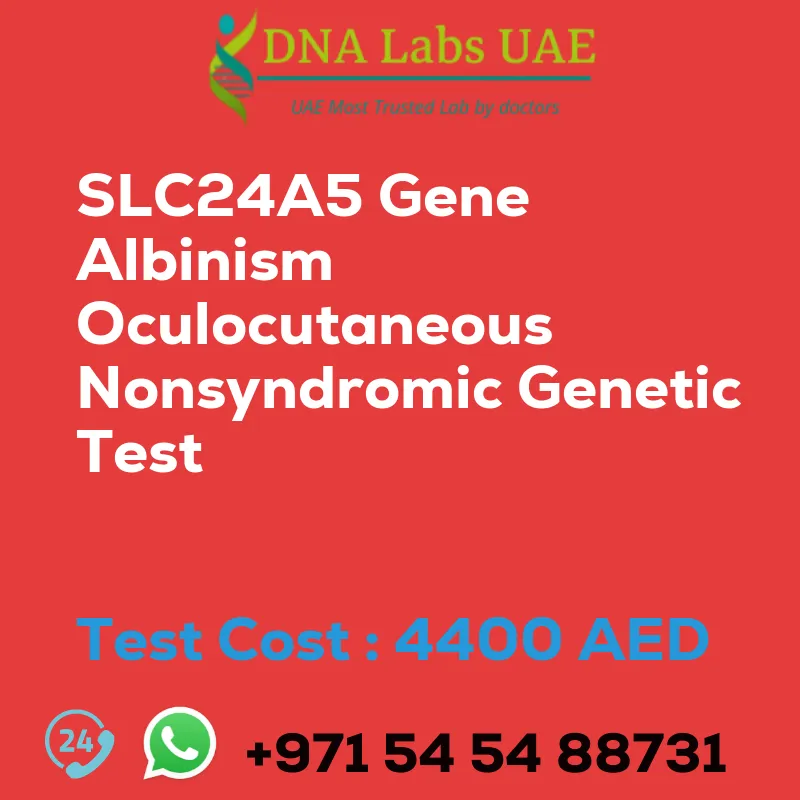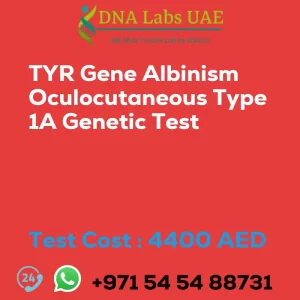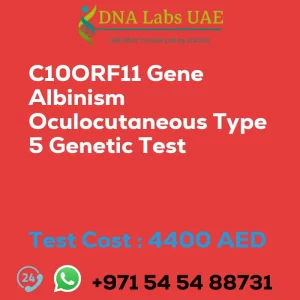SLC24A5 Gene Albinism Oculocutaneous Nonsyndromic Genetic Test
Welcome to DNA Labs UAE, where we offer the SLC24A5 Gene Albinism Oculocutaneous Nonsyndromic Genetic Test. This test is designed to diagnose and identify the specific type of albinism associated with variations in the SLC24A5 gene. Read on to learn more about the test details, cost, symptoms, and diagnosis process.
Test Details
The SLC24A5 gene is associated with oculocutaneous albinism type 2 (OCA2), a rare genetic disorder characterized by reduced or absent melanin pigment in the skin, hair, and eyes. Our test uses NGS (next-generation sequencing) technology to analyze DNA and identify variations in the SLC24A5 gene that may be linked to albinism.
Components and Price
The cost of the SLC24A5 Gene Albinism Oculocutaneous Nonsyndromic Genetic Test is AED 4400.0. The test requires a blood sample or extracted DNA, or just one drop of blood on an FTA card.
Report Delivery and Method
After the sample is collected, the report will be delivered within 3 to 4 weeks. Our lab uses NGS technology for this test, ensuring accurate and comprehensive results.
Test Type and Doctor
The SLC24A5 Gene Albinism Oculocutaneous Nonsyndromic Genetic Test falls under the category of Ophthalmology Disorders. It is recommended to consult with an Ophthalmologist for this test.
Test Department and Pre Test Information
The SLC24A5 Gene Albinism Oculocutaneous Nonsyndromic Genetic Test is conducted in our Genetics department. Prior to the test, it is important to provide the clinical history of the patient and attend a genetic counseling session. During the session, a pedigree chart will be drawn to identify any family members affected by the SLC24A5 Gene Albinism.
Diagnosis and Benefits of Genetic Testing
Genetic testing can help confirm a diagnosis of albinism and determine the specific type. It can also be useful for family members, as it identifies whether they carry the same genetic variation and are at risk of passing it on to their children. However, it’s important to note that genetic testing is not always necessary for a diagnosis, as physical symptoms and medical history can often be sufficient.
Considerations
It’s important to be aware that genetic testing may not be covered by insurance and can be expensive. It is recommended to consult with a healthcare provider to determine whether genetic testing is appropriate in your specific case.
At DNA Labs UAE, we strive to provide accurate and reliable genetic testing services. If you suspect albinism or have a family history of the condition, our SLC24A5 Gene Albinism Oculocutaneous Nonsyndromic Genetic Test can provide valuable insights. Contact us today to schedule an appointment or for more information.
| Test Name | SLC24A5 Gene Albinism oculocutaneous nonsyndromic Genetic Test |
|---|---|
| Components | |
| Price | 4400.0 AED |
| Sample Condition | Blood or Extracted DNA or One drop Blood on FTA Card |
| Report Delivery | 3 to 4 Weeks |
| Method | NGS Technology |
| Test type | Ophthalmology Disorders |
| Doctor | Ophthalmologist |
| Test Department: | Genetics |
| Pre Test Information | Clinical History of Patient who is going for SLC24A5 Gene Albinism, oculocutaneous nonsyndromic NGS Genetic DNA Test. A Genetic Counselling session to draw a pedigree chart of family members affected with SLC24A5 Gene Albinism, oculocutaneous nonsyndromic NGS Genetic DNA Test gene SLC24A5 |
| Test Details |
The SLC24A5 gene is associated with oculocutaneous albinism type 2 (OCA2), which is a rare genetic disorder characterized by reduced or absent melanin pigment in the skin, hair, and eyes. The SLC24A5 gene provides instructions for making a protein that is involved in the transport of ions across cell membranes, which is important for melanin production. Variations in this gene can lead to reduced melanin production, resulting in the symptoms of albinism. NGS (next-generation sequencing) genetic testing is a type of genetic testing that uses advanced technology to sequence and analyze DNA. This type of testing can identify variations in the SLC24A5 gene that may be associated with albinism. NGS testing can provide a more comprehensive analysis of a person’s genetic makeup than traditional genetic testing methods. If a person is suspected of having albinism, genetic testing can be helpful in confirming the diagnosis and determining the specific type of albinism. Genetic testing can also be useful for family members of a person with albinism, as it can identify whether they carry the same genetic variation and are at risk of passing it on to their children. It is important to note that genetic testing is not always necessary for a diagnosis of albinism, as the condition can often be diagnosed based on physical symptoms and a medical history. Additionally, genetic testing may not be covered by insurance and can be expensive. A healthcare provider can help determine whether genetic testing is appropriate in a particular case. |







